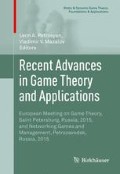Abstract
Classical analysis of the power of individuals or groups in decision making bodies tends to consider processes of coalition formation in isolation from each other. However, the results of attempts to form a winning coalition will affect the dynamics of coalition formation in the future, particularly when certain players are endowed with the power of veto. When a voter invokes their power of veto to block a generally popular motion, this is likely to provoke retaliation from the supporters of the motion. For this reason, even if a player is not in favor of a bill and can block it, it may be favorable for that party to abstain rather than veto in return for support regarding issues to be considered in the future. Hence, players should only use their power of veto if they are very strongly against a bill. In this paper, we present a model of voting in which the results of previous votes can affect the process of coalition formation. We present a model of such a dynamic voting game and present the form of an equilibrium in such a game. This theory is illustrated using an example based on the voting procedures used in the United Nations Security Council.
Access this chapter
Tax calculation will be finalised at checkout
Purchases are for personal use only
References
Başar, T., Olsder, G.J.: Dynamic Noncooperative Game Theory. SIAM Classics in Applied Mathematics, vol. 23, 2nd edn. SIAM, Philadelphia (1999)
Brams, S.J.: Negotiation Games. Routledge, New York (1990)
Clauset, A., Shalizi, C.R., Newman, M.E.J.: Power-law distributions in empirical data. SIAM Rev. 51 (4), 661–703 (2009)
Kennedy, P.: The Parliament of Man. Vintage, New York (2007)
Mercik, J.: Classification of committees with vetoes and conditions for the stability of power indices. Neurocomputing 149 (C), 1143–1148 (2015)
Mercik, J., Ramsey, D.: On a simple game theoretical equivalence of voting majority games with vetoes of first and second degrees. In: Nguyen, N.T., Trawiński, B., Kosala, R. (eds.) Intelligent Information and Database Systems: 7th Asian Conference, ACIIDS 2015, Bali, Indonesia, 22–25 March 2015, Proceedings, Part 1, pp. 284–294. Springer, Heidelberg (2015)
Nossal, K.R.: International sanctions as international punishment. Int. Organ. 43 (2), 301–322 (1989)
Ramsey, D., Mercik, J.: A formal a priori power analysis of the Security Council of the United Nations. In: Kersten, G., Kamiński, B., Szufel, P., Jakubczyk, M. (eds.) Proceedings of the 15th International Conference on Group Decision & Negotiation. Warsaw School of Economics Press, Warsaw (2015)
Ramsey, D., Mercik, J.: An equilibrium in a sequence of decisions with veto of first degree. In: Nunez, M., Nguyen, N.T., Camacho, D., Trawiński, B. (eds.) Computational Collective Intelligence. 7th International Conference, ICCCI 2015, Madrid, Spain, 21–23 September 2015, Proceedings, Part I, pp. 285–294. Springer, Cham (2015)
von Neumann, J., Morgenstern, O.: Theory of Games and Economic Behavior. Princeton University Press, Princeton (1944)
Xinbo, W.: Four contradictions constraining China’s foreign policy behavior. J. Contemp. China 10 (27), 293–301 (2001)
Author information
Authors and Affiliations
Corresponding author
Editor information
Editors and Affiliations
Rights and permissions
Copyright information
© 2016 Springer International Publishing Switzerland
About this chapter
Cite this chapter
Mercik, J., Ramsey, D.M. (2016). A Dynamic Model of a Decision Making Body Where the Power of Veto Can Be Invoked. In: Petrosyan, L., Mazalov, V. (eds) Recent Advances in Game Theory and Applications. Static & Dynamic Game Theory: Foundations & Applications. Birkhäuser, Cham. https://doi.org/10.1007/978-3-319-43838-2_7
Download citation
DOI: https://doi.org/10.1007/978-3-319-43838-2_7
Published:
Publisher Name: Birkhäuser, Cham
Print ISBN: 978-3-319-43837-5
Online ISBN: 978-3-319-43838-2
eBook Packages: Mathematics and StatisticsMathematics and Statistics (R0)

